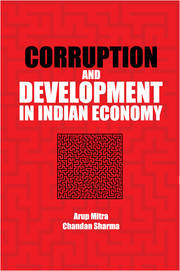Book contents
- Frontmatter
- Contents
- List of Tables and Figures
- Preface
- 1 Issues in Corruption: Theoretical and Empirical
- 2 Corruption in India: A Comparison with the Rest of the World
- 3 Estimation of Personal Income Tax Evasion in India: Evidence from Household Survey
- 4 Effects of Corruption on Firms' Performance: Evidence from Firm Level Data
- 5 Determinants of Bribery in Indian Firms: Who Must Pay Bribes?
- 6 Labour Market Flexibility and Corruption: Issues Related to Labour Contractualization and Business Subcontracting
- 7 Corruption in Innovation: Effect of Innovation on Performance
- References
- Index
6 - Labour Market Flexibility and Corruption: Issues Related to Labour Contractualization and Business Subcontracting
Published online by Cambridge University Press: 23 July 2017
- Frontmatter
- Contents
- List of Tables and Figures
- Preface
- 1 Issues in Corruption: Theoretical and Empirical
- 2 Corruption in India: A Comparison with the Rest of the World
- 3 Estimation of Personal Income Tax Evasion in India: Evidence from Household Survey
- 4 Effects of Corruption on Firms' Performance: Evidence from Firm Level Data
- 5 Determinants of Bribery in Indian Firms: Who Must Pay Bribes?
- 6 Labour Market Flexibility and Corruption: Issues Related to Labour Contractualization and Business Subcontracting
- 7 Corruption in Innovation: Effect of Innovation on Performance
- References
- Index
Summary
Background
In this chapter, we turn to changes that have occurred in the labour market after globalization and explain how these changes have encouraged corrupt practices to deny labour its due share. Enhancing the profit margin by any means has become an important mandate - in the limited-demand-excess-supply situation in the labour market this implies a reduction in the factor income. Particularly if the labour market institutions do not exist or are made to become docile, it provides scope to introduce on a large scale the corruptive practices which reduce wages. Fixation of wages, ideally speaking, has to go beyond the demand-supply framework because labour cannot be treated like any other non-human factor of production. The minimum food consumption requirements, the basic needs other than food and factors which contribute to enhancing labour productivity are to be kept in view. Even when it comes to substitution of labour by capital certain guiding principles are to be followed so that a situation does not arise which leads to pure mechanization. In other words, employment generation without allowing wages to fall below a certain basic minimum is an important consideration. But in a pure market economy without any labour market institution this is unlikely to happen because a large number of players at various stages can create scope for misappropriation of labour income. Since, relatively speaking, it is difficult to reduce the income of all the factors, there is a tendency to identify a softer target.
Usually in the standard literature, corruption takes place, as we have seen in chapter 1, when regulations are strict and there are possibilities for violating those regulations in exchange of transfers. Stretching this argument labour market regulations are also interpreted as the source of corruption as they encourage alliances between the firms and officials who are part of the implementing authority. In order to avoid labour regulations applicable to the units falling into the formal sector, firms take recourse to informality (Amirapu and Gechter, 2014). However, as we argue in this chapter informality also introduces numerous mechanisms which render labour to a vulnerable position.
- Type
- Chapter
- Information
- Corruption and Development in Indian Economy , pp. 102 - 123Publisher: Cambridge University PressPrint publication year: 2016



